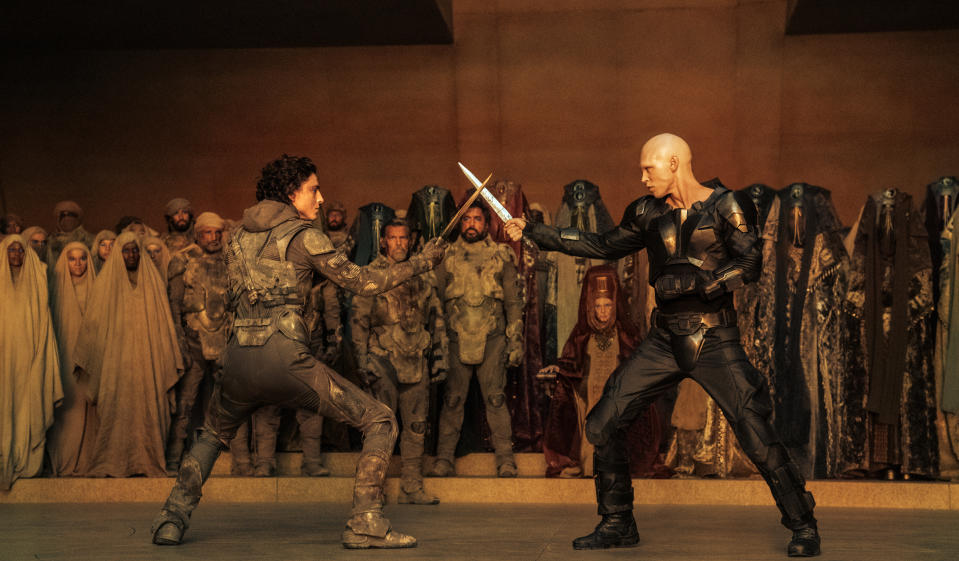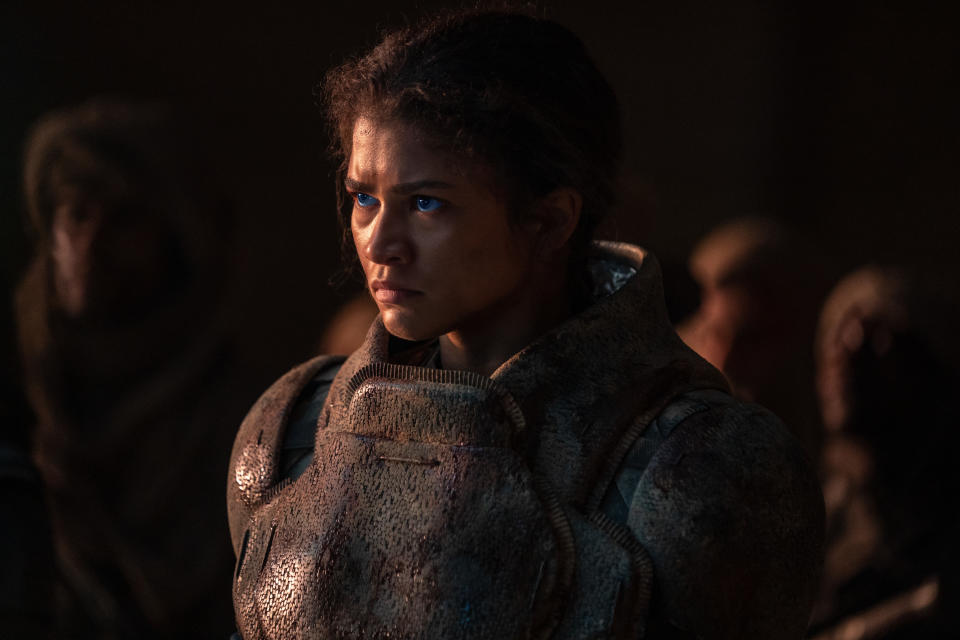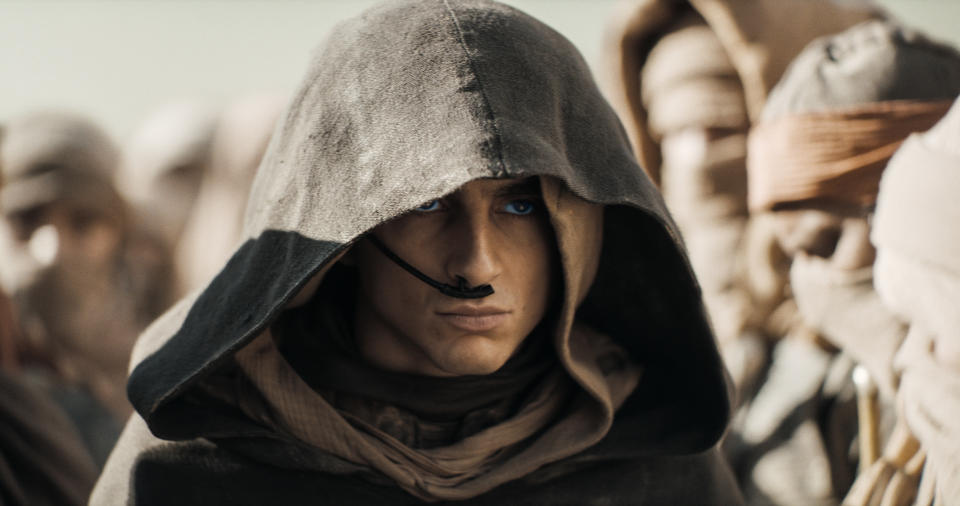How the Ending of Dune: Part Two Sets Up a Third Movie
Warning: This post contains spoilers for Dune: Part Two.
By the end of Dune: Part Two, now in theaters, Timothée Chalamet's Paul Atreides has completed his transformation into revolutionary leader Muad'Dib, gaining control of not only the desert planet Arrakis but also the entirety of the galactic empire known as the Imperium in the process. However, that doesn't mean everything is all sugar and spice, so to speak.
The conclusion of the second film in Denis Villeneuve's Dune saga stays largely true to the story laid out in Frank Herbert's 1965 novel, with Paul mobilizing the Fremen in an all-out assault against the Harkonnen and Sardaukar forces, defeating Feyd-Rautha Harkonnen (Austin Butler) in a duel, and claiming the Imperial throne by agreeing to marry Princess Irulan Corrino (Florence Pugh), the eldest daughter of Padishah Emperor Shaddam Corrino IV (Christopher Walken).

"The Dune book ends with the beginning of something that is out of control, and I thought this was a very powerful ending," Villeneuve told Vanity Fair. "I feel that both movies complete the adaptation of the book, and I feel very good about that."
Read more about Dune:
However, Villeneuve made a few big changes to the source material that significantly impact the character arcs of some of Dune's most important players—and could factor in to how the director's adaptation of the second novel in Herbert's Dune series, Dune Messiah, plays out down the road.
In the run-up to the release of Part Two, Villeneuve told TIME that he is at work another Dune movie, though he doesn't have plans to make more beyond a third film: “Dune Messiah should be the last Dune movie for me,” he said.
How is Dune: Part Two different than the book?
As an at-first reluctant Paul grows more powerful and eventually moves to claim his place as the Lisan-al-Gaib—a prophesied messiah who many Fremen believe is a "Voice from the Outer World" who will lead them to freedom—the three most important women in his life, his partner Chani (Zendaya), mother Jessica (Rebecca Ferguson), and younger sister Alia (Anya-Taylor-Joy), all play a part in his ascent.
Both Chani and Jessica's roles are expanded in the movie, with Villeneuve explaining that he didn't like the idea of keeping them in the background for the second half of the story. "I am absolutely in love with both characters," he told Entertainment Weekly. "I felt it was more meaningful to give them more substance and presence, their own agendas."
This pits the two somewhat against each other, with Jessica working to fan the flames of religious fervor surrounding the Lisan-al-Gaib prophecy—which was planted among the Fremen by the Bene Gesserit hundreds of years earlier—while Chani wholeheartedly pushes back against the idea that Fremen salvation is going to come at the hands of an outsider.

"Something that I really appreciated about what Denis did with Chani is that he does give her her own convictions and heart," Zendays told Entertainment Weekly. "In the book, she kind of immediately acquiesces to the fact that [Paul's] the messiah and she never questions it.”
By the end of the movie, Chani is so disgusted by Paul's actions that she is shown preparing to ride away on a giant sandworm after Paul has sealed his victory. In the books, Chani stands by as Paul declares he will wed Irulan to solidify his rule and goes on to accept that she can only ever be formally known as his concubine—despite the fact that he considers her his wife in all but name.
But it's Alia's storyline that undergoes the most drastic changes in the movie. While Alia is a small child for much of the second half of the book, due to Villeneuve opting not to include any significant time jumps in Dune: Part Two, Jessica remains pregnant with Alia throughout the entirety of the film. Alia still becomes pre-born—meaning she gains consciousness and inherits the memories of all of her female ancestors while still in the womb—after Jessica ingests the Water of Life, but she doesn't play a direct role in the story outside of telepathically advising her mother and brother. Instead, Paul takes her place as the one to kill their grandfather, the Baron Vladimir Harkonnen (Stellan Skarsgård), during the final battle.
What is Dune Messiah about?
While the Dune novels grow increasingly bizarre as the series progresses—the fourth book, God Emperor of Dune, is told from the point of view of Paul and Chani's now-3,500-year-old son, Leto Atreides II, after he's transformed into a giant sandworm-human hybrid—Dune Messiah is a worthy follow-up to its classic predecessor that helps to solidify Herbert's most pressing themes.
Picking up 12 years after the events of the first book, Messiah sees Paul, now predominantly known as Muad'Dib, turn from a respected leader into a despotic ruler. As Emperor of the Known Universe, Paul wields more power than any one person should ever possess. He has failed to contain the holy war being waged in name—with his Fremen fighters killing billions across the universe in the decade-plus since the end of Dune—while also contending with conflict over the control of spice production and numerous threats to his reign.

The idea that Paul is not a hero was a takeaway from Dune that Herbert felt many readers had failed to grasp—and that he wanted to make more clear in Messiah.
"When Frank Herbert wrote Dune, he was disappointed at how people perceived Paul," Villeneuve told Entertainment Weekly. "In his mind, Dune was a cautionary tale—a warning against charismatic figures. He felt that Paul was perceived as a hero, when he wanted to do the opposite. So in order to correct that, he wrote Dune Messiah, a kind of epilogue that makes it very clear this story is not a victory, it’s a tragedy."
Villeneuve's adaptation of Dune Messiah has yet to be officially greenlit. But given the overwhelmingly positive response to Dune: Part Two, it basically seems like a foregone conclusion. Still, it might be a while until another Dune movie hits theaters.
"We didn’t have a second to rest between Part One and Part Two,” Villeneuve told Vanity Fair. “I’m not complaining! I’m explaining that now I would just like to settle down a little bit and to think about how to approach a third chapter, the adaptation of Dune Messiah, which makes absolute sense because it’s the end of the arc of Paul Atreides.”
Write to Megan McCluskey at megan.mccluskey@time.com.


